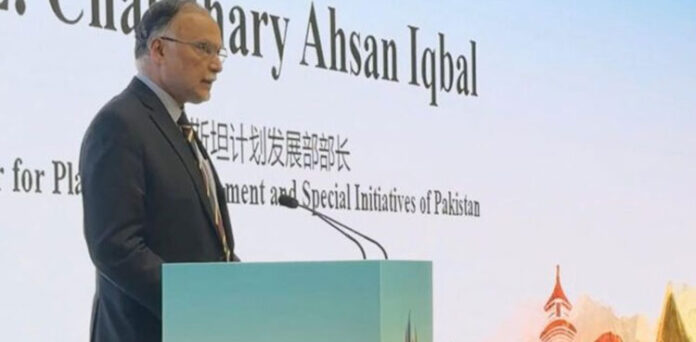ISLAMABAD: Minister for Planning and Development Ahsan Iqbal on Saturday unveiled a transformative step towards economic diversification and sustainable growth with the establishment of dedicated units for Creative Industries and the Blue Economy.
These new units are part of the broader 5Es National Economic Transformation Plan, a comprehensive strategy aimed at driving Pakistan towards a resilient and prosperous future, said a statement issued today.
According to the statement, the Creative Industries unit will focus on harnessing the potential of Pakistan’s rich cultural heritage, vibrant arts, and innovative design sectors.
This initiative aims to foster economic growth through the promotion of creative talents and the development of creative hubs that will support entrepreneurship, job creation, and cultural exchange.
“The creative economy is a vital component of our national development strategy.” adding that “By investing in our creative industries, we are not only preserving our cultural heritage but also creating new economic opportunities that can contribute significantly to our GDP and employment rates,” Ahsan Iqbal said.
Globally, the Creative Industries are one of the fastest-growing sectors of the world economy. According to UNESCO, the creative economy generates $2.25 trillion annually and provides nearly 30 million jobs worldwide.
With over 60 percent of Pakistan’s population under the age of 30, the country boasts a vast reservoir of youthful energy and creativity. This young demographic presents a unique opportunity to drive innovation and entrepreneurship in the creative sectors, a press release added.
By providing the necessANN(Asian News Network) infrastructure, training and support, the Creative Industries unit aims to unlock the potential of Pakistan’s youth, enabling them to contribute to the national economy and compete on a global stage.
Meanwhile, the Blue Economy unit will concentrate on the sustainable utilization of Pakistan’s vast maritime resources. This unit will work on developing policies and projects that enhance the sustainable use of ocean resources for economic growth, improved livelihoods, and the preservation of marine ecosystems.
Key areas of focus will include fisheries, maritime tourism, marine biotechnology, and renewable ocean energy.
The minister said that “The Blue Economy holds immense potential for Pakistan, given our extensive coastline and marine resources,” adding that “Through sustainable practices and innovative policies, we aim to unlock the economic potential of our oceans while ensuring environmental protection and social inclusion.”
The Blue Economy is a rapidly expanding sector globally, with the World Bank estimating that it could generate $3 trillion annually by 2030. Pakistan’s coastline stretches over 1,046 kilometers, offering significant opportunities for the development of maritime industries.
The China-Pakistan Economic Corridor (CPEC) provides a substantial boost to Pakistan’s Blue Economy. By enhancing port infrastructure, developing coastal tourism, and fostering maritime trade, CPEC creates new opportunities for economic development.
The strategic Gwadar Port, in particular, is set to become a hub of maritime activity, facilitating trade routes and attracting investment in maritime industries.
The establishment of these units aligns with the 5Es National Economic Transformation Plan, which emphasizes Export Promotion, Environment, Energy, Education, and Employment.
By integrating creative and blue economies into this strategic framework, the government aims to create a diversified economic base that can withstand global economic shifts and foster long-term sustainable development.
Ahsan Iqbal expressed his commitment to ensure that these initiatives will involve multi-stakeholder engagement, including partnerships with private sector entities, academia, and international organizations. This collaborative approach is intended to bring in expertise, investment, and innovation to drive the success of these sectors.
The Ministry of Planning and Development will soon launch detailed action plans for both units, outlining specific projects, timelines and expected outcomes. Stakeholders from across Pakistan are encouraged to engage with these initiatives to maximize their impact and contribute to the nation’s economic transformation.
